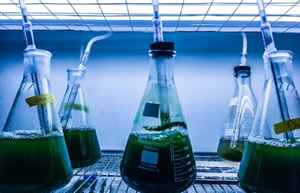Seeding Food Innovation - Awarded Project 2018
New algal bioreactor design for clean food production with inland aquaculture
Project Description

With increasing demand for fish and seafood products globally, inland aquaculture is becoming an important source of global food production. This is primarily because food can be produced in proximity to large and densely populated areas, cutting down on transportation costs and emissions. It also allows the use of a more diverse set of species as the risk of local species introductions is significantly reduced. Finally, inland aquaculture is less prone to natural disasters (hurricanes, typhoons, blooms, water contamination etc.). We are developing a photo-bioreactor for the removal of nutrients from recirculating aquaculture systems (RAS), making inland seafood production more sustainable and cost effective.
Relevance to the field of food innovation
The use of plants (and specifically algae) for nutrient removal from wastewater is a relatively new and promising direction. Over the years, a range of approaches has been proposed to implement such technologies. In contrast to the bacterial systems commonly used in the industry, our bioreactors will remove nitrogen, phosphate and CO2 at the same time, whilst also producing algae for commercialization.
Anticipated outcome
This project has the potential to disrupt the aquaculture industry by making inland aquaculture significantly more profitable and sustainable by reducing operating costs and creating added value with algae that can be commercialized as part of the aquaculture operation. If successful, it will also mitigate the potential risks that aquaculture in coastal areas face due to storms, phytoplankton blooms and environmental contamination.
Grantees:

Dr. Andreas Hyland
After completing his M.Sc. at the University of Zurich (Switzerland) and the Marine Biological Laboratory in Banyuls sur mer, France, Dr Heyland moved to the University of Florida in Gainesville, Florida, where he completed his Ph.D. in Zoology and Physiology in 2004. After post-doctoral work at the Whitney Laboratory for Marine Bioscience (FL, USA) and the Friday Harbor Laboratories, University of Washington (WA, USA) he started his position at the University of Guelph in 2008.
» More Info

Dr. Wael Ahmed
Dr. Ahmed, Associate Professor at the University of Guelph, works in the thermo-fluid area with particular interest in multiphase flow analysis of water, food and energy systems. Wael Ahmed received his PhD in Mechanical Engineering from McMaster University in 2005. He has over 22 years of academic and industrial experience. He designed efficient airlift pumps for many industrial applications including food, oil & gas and nuclear energy. Several pumping units of his design are patented and currently used by aquaculture facilities
» More Info
[Back]